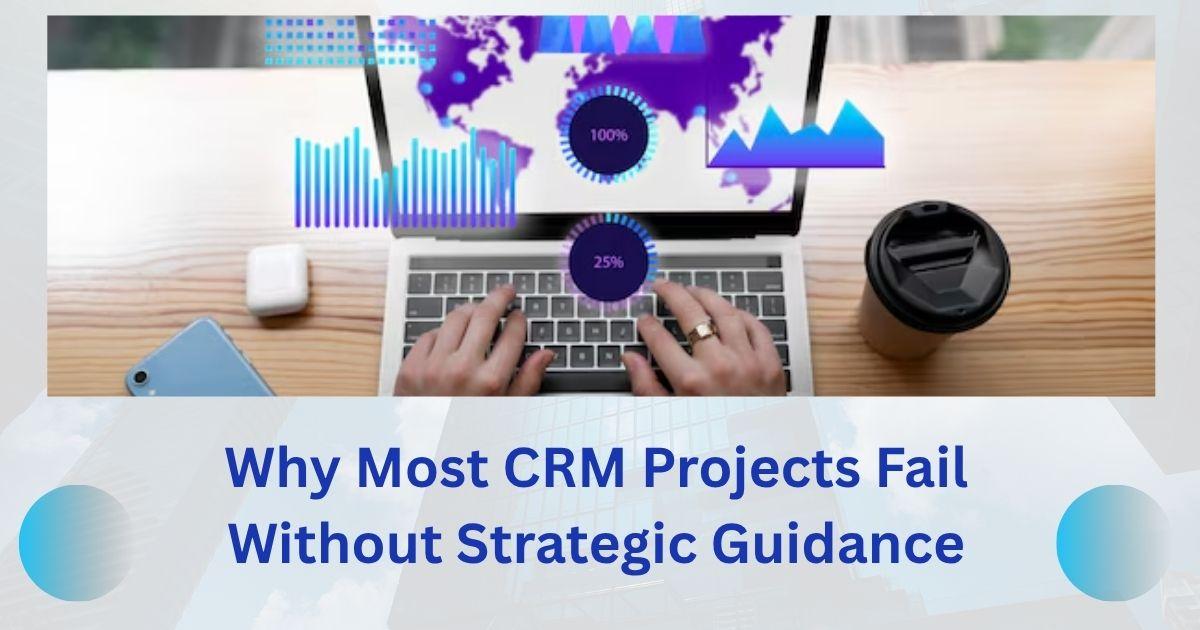CRM systems are powerful tools that streamline processes in sales, marketing and customer service. Many CRM projects fail to deliver on their promises despite substantial investments. These reasons are often not the fault of the software -- but rather, they stem from a lack of planning and customization.This is where Salesforce consulting and implementation plays a crucial role.
Businesses struggle to align their CRM capabilities with specific workflows and business goals without the right guidance. Salesforce is a complex platform that requires more than a technical setup. It also demands a strategy to ensure every feature supports the business goals and user adoption. This blog explores why CRM projects fail and how the right advice can make a huge difference.
1. Lack of Clear Objectives
Most businesses rush to implement CRM without a clear goal in mind. It's impossible to measure the success of a project without measurable goals, such as increasing lead conversions, improving retention or automating manual tasks.
A strategic map created in the early stages of consulting can help determine these goals and align them with Salesforce or other CRM capabilities. This ensures your CRM is more than just a database. It's a tool to grow your business.
2. Poor User Adoption
Low user adoption is one of the main reasons why CRM systems fail. Teams are often reluctant to adopt new platforms, either because they do not see the value immediately, the interface is confusing or that they were not involved in the set-up process.
Strategic consultants bridge the gap by:
-
Include end users in the training and planning process
-
Customizing CRM to existing workflows
-
Offering post-implementation support.
It is important that the system be intuitive and useful to users, and encourages them to use it consistently across departments.
3. Inadequate Customization
Each business has its own unique processes, customer journeys and reporting requirements. These specifics are rarely addressed by off-the-shelf configurations of CRM, resulting in frustration and inefficiency.
A generic implementation may track contacts and deal but not accommodate specific approval hierarchies or service workflows. The consultants will analyze the business processes and then tailor CRM to meet those needs. They may set up dashboards, integrations, automations and custom objects.
4. Data Migration Mistakes
The migration of customer data from legacy systems or spreadsheets is a critical step in any CRM project. It's also one of the easiest steps to get wrong. Data that is incomplete, duplicated or incorrectly formatted can make the CRM inaccessible from day one.
Strategic planning ensures that:
-
Proper data cleansing before migration,
-
Data fields mapping to the new CRM structure
-
Validation after migration to maintain data integrity.
This will ensure that the users get accurate and reliable data right from the beginning, thereby building their trust in the system.
5. Overcomplicating the System
A second pitfall is to try and do too much all at once. Businesses can get too excited by automation and advanced features. They add unnecessary complexity. This can overwhelm users and increase the risk of technical error.
Consultants with experience can help you to prioritize. They begin with a simple, focused setup. As the team becomes more comfortable, they expand features. This phased approach avoids confusion, and allows users to adapt and learn gradually.
6. Ignoring Change Management
Implementing CRM is not just a technological change, but also an organizational one. Resistance is inevitable without a structured change management approach.
The strategic guidance process involves more than just setting up a system. It also includes preparing your team for change. This includes:
-
Communication about benefits in a transparent manner
-
Each role will receive a tailored training session.
-
Feedback loops post-implementation.
Consultants make sure that everyone, from the top management to the end users, understands how CRM can support their roles and goals.
7. Skipping Post-Launch Support
Many companies view CRM implementation as an one-time task. The real value of CRMs is revealed over time, through regular improvements, new features, and tweaks to reporting.
Ongoing strategic support is essential to:
-
Continued alignment with growth of business
-
Troubleshooting technical problems
-
Introduce new Salesforce features when they become available.
Your CRM could become outdated and out of date with changing business needs.
Conclusion
The success of your CRM project will not be determined by the platform that you select, but by how you use and implement it. Businesses risk losing time, money and potential by implementing underperforming systems without strategic guidance.
Partnering with a Salesforce implementation consultant ensures your CRM is not only set up correctly but also aligned with your long-term business vision. With expert planning, training, and customization, your Salesforce system becomes a growth enabler—not just a digital address book.



